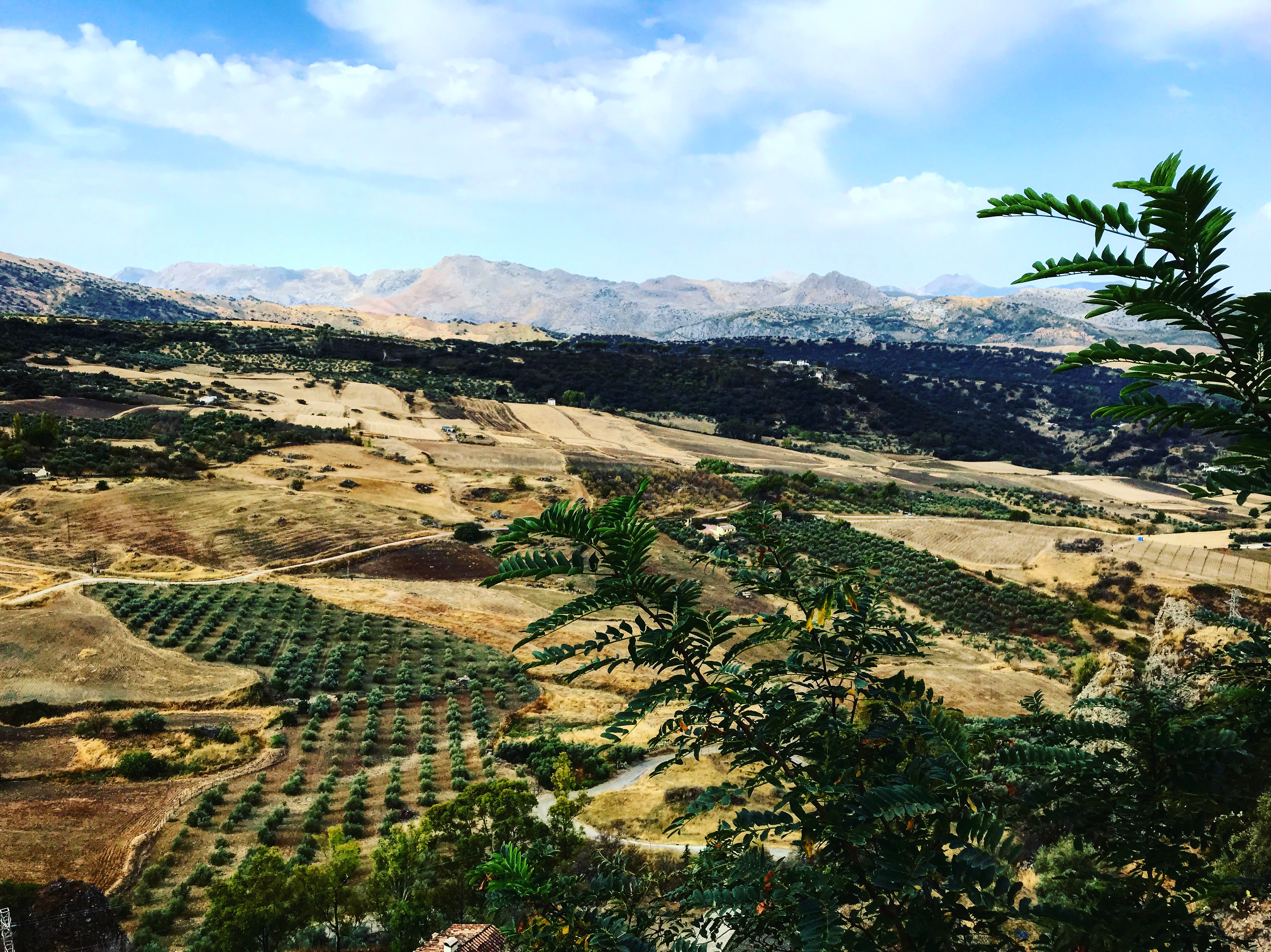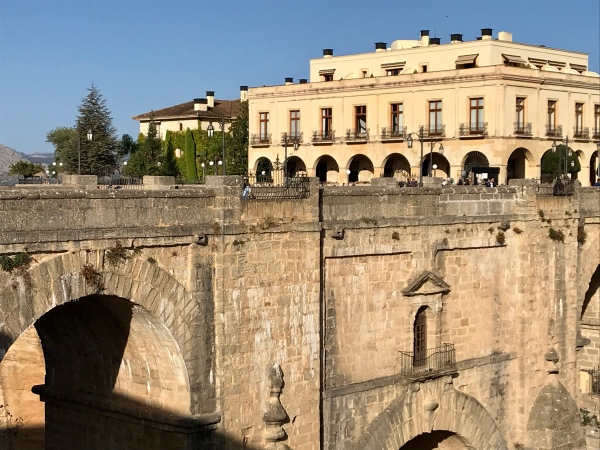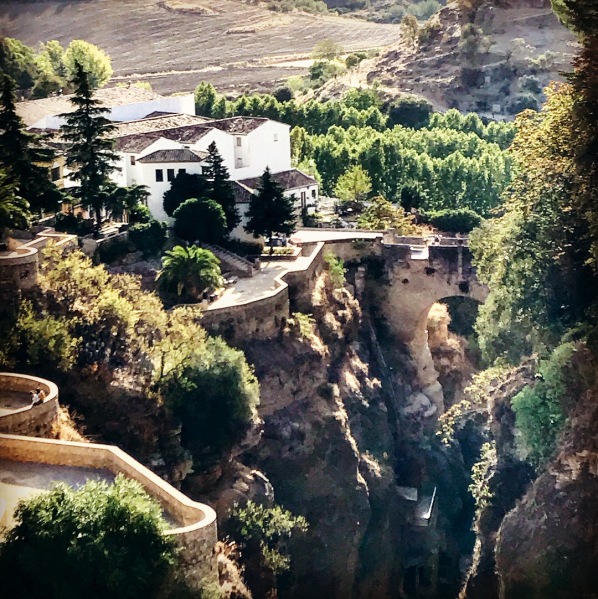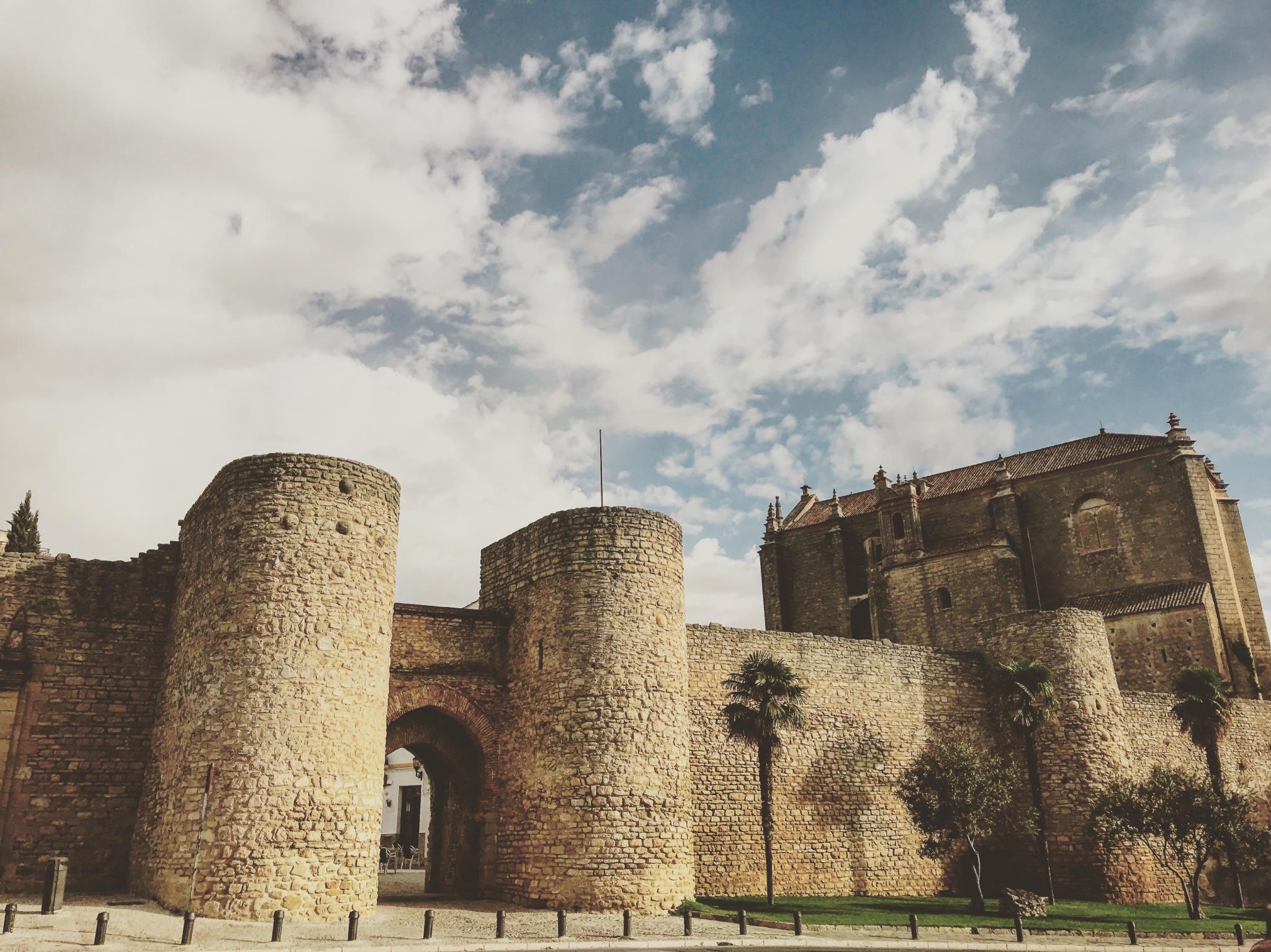Ronda – A Wander Around
 My train journey from Cordoba arrives late evening, having travelled for the past hour through scenery reminiscent of the wild, wild west. Ronda itself is a very compact town and I manage
My train journey from Cordoba arrives late evening, having travelled for the past hour through scenery reminiscent of the wild, wild west. Ronda itself is a very compact town and I manage  to walk to my hotel, just north of Plaza Socorro, and settle in for an early morning start.
to walk to my hotel, just north of Plaza Socorro, and settle in for an early morning start.
At the crack of dawn, I am stood at the Plaza del Socorro. It’s beautiful yellow and white Caritas Parroquial creates a lovely backdrop for this lively square (later on) of casual eateries and outdoor seating.
 From the square I head out to discover why thousands of visitors descend on Ronda. I head to the Alameda del Tajo, Squinting through the shady and pretty lines of tree, I get my first glimpse of the vast vista that unfolds in front of me as I reach the overhanging promenades. Dawn breaks as I continue along the cliff edge toward
From the square I head out to discover why thousands of visitors descend on Ronda. I head to the Alameda del Tajo, Squinting through the shady and pretty lines of tree, I get my first glimpse of the vast vista that unfolds in front of me as I reach the overhanging promenades. Dawn breaks as I continue along the cliff edge toward s the Real Maestransza bull ring. There is a museum about this old Spanish tradition, which I visit later on.
s the Real Maestransza bull ring. There is a museum about this old Spanish tradition, which I visit later on.
However I still haven’t devoured enough of the compelling views of the Tajo Gorge. So I make my way along the cliff to the Mirador de Ronda. It reminds me of a Victorian pergola, perched on a precipice with a birds eye view of the gorge carved out by the Guadelevin river.
I follow the walkway, along Paseo E Hemingway where  I study a board listing the hills I can see in the distance. When I turn around the corner, I get my first of many views of the Puente Nuevo with its vertigo challenging views.
I study a board listing the hills I can see in the distance. When I turn around the corner, I get my first of many views of the Puente Nuevo with its vertigo challenging views.
Just across the road, I stumble across another mirador. (It really isn’t hard in this town). The Mirador de Aldehuela has views to the east of the gorge and over the Jardines de Cuenca. I continue a little further across the Puente Nueve. In a little gallery to my right, I spot No 6, Despacho de Vinos, a bar with a view. I shall be back for a glas s of wine later.
s of wine later.
But for now I decide to visit the Jardines de Cuenca. I double back, and turn right into Calle Rosario by the Hotel San Miguel. By the time I reach Jardines de Cuenca, Puente Nueve is up in the heavens, or so it seems. And still, I continue to descent down the garden steps, soaking up the views of the gorge and the Casa del Rey Moro.
When I reach the bottom, I venture up to Fuente de los Ocho Canos by the Iglesia de Padre Jesus. Whilst the medieval fonts have disappointingly been replaced by modern pipes, I am not disappointed by the views afforded of the Puente Viejo and the castle walls from my vantage point.
 By the tourist board at the bridge, I find a set of steps. Reluctant as I am to face the eventual climb up, I continue heading down. And I find yet another bridge, the Puente Arabe, from which there are excellent views of the Puente Viejo above me.
By the tourist board at the bridge, I find a set of steps. Reluctant as I am to face the eventual climb up, I continue heading down. And I find yet another bridge, the Puente Arabe, from which there are excellent views of the Puente Viejo above me.
 The Banos Arabes (Arab baths) are also by here. However I give it a miss for now and set off along the valley path, where the once defensive city walls run alongside me. I look for the “road” on Google map that takes me back up to Calle Marbella, and town. It turns out to be a dirt track by some allotments. But it spills me out on to a busy road and a café, where I meet two locals having a sherry, at 10:00 in the morning !! If I wasn’t so parched, I would have joined them.
The Banos Arabes (Arab baths) are also by here. However I give it a miss for now and set off along the valley path, where the once defensive city walls run alongside me. I look for the “road” on Google map that takes me back up to Calle Marbella, and town. It turns out to be a dirt track by some allotments. But it spills me out on to a busy road and a café, where I meet two locals having a sherry, at 10:00 in the morning !! If I wasn’t so parched, I would have joined them.
 I climb Calle Marbella and shortly arrive at the largest and most protected city gate, Puerta de Almocabar. I find out that it takes its name from the Arabic cemetery (al-maqabir) which stood in this part of town. The Almocabar gate faces Gibraltar and the sea, and therefore would have been the main point of entry.
I climb Calle Marbella and shortly arrive at the largest and most protected city gate, Puerta de Almocabar. I find out that it takes its name from the Arabic cemetery (al-maqabir) which stood in this part of town. The Almocabar gate faces Gibraltar and the sea, and therefore would have been the main point of entry.
 The Plaza Ruedo Alameda across the road from the Almocabar is quite pleasant, with a good selection of restaurants. But as its too early for lunch, I turn around to go through the gates, where I find myself in a very charming cobbled thoroughfare. I am enticed by the “Secret Garden”, just behind the Iglesia del Espiritu Santo. I am rewarded with great views a
The Plaza Ruedo Alameda across the road from the Almocabar is quite pleasant, with a good selection of restaurants. But as its too early for lunch, I turn around to go through the gates, where I find myself in a very charming cobbled thoroughfare. I am enticed by the “Secret Garden”, just behind the Iglesia del Espiritu Santo. I am rewarded with great views a nd a mediocre ham sandwhich.
nd a mediocre ham sandwhich.
Another uphill hike, gets me to the Plaza Duquesa de Parcent . I am in total agreement with the weblink that the star of the square is the Santa Maria del Mayor church. The highlight – its amazing chandelier. And the roof walk with its 360 degree view of Ronda.
From the square, there are several places of interest to visit as follows:
- The Jooaquin Peinado Museum located in the Palacio del Marqués de Moctezuma, the old palace of the heir of the last free Aztec emperor, Moctezuma II.
- The very romantic Museo de Bandeleros ( I am a sucker for Robin Hood type characters)
- The Museo de Vino. Perhaps I have a trusting face, but I got free rein of the sherry taps (yes they were on tap!!).
 Now less sober, I persist upwards and onwards to Mondragon Palace. I fall in love with this Mudejar palace. It’s peaceful courtyards face the very same mountains that I had seen from the Alameda del Tajo.
Now less sober, I persist upwards and onwards to Mondragon Palace. I fall in love with this Mudejar palace. It’s peaceful courtyards face the very same mountains that I had seen from the Alameda del Tajo.
 On exiting, I stumble across the lively Plaza de Maria Auxiliadora. As it’s busy with tourists, I dive into El Morabito and enjoy a glass of wine on its balcony. A blissful half hour indeed.
On exiting, I stumble across the lively Plaza de Maria Auxiliadora. As it’s busy with tourists, I dive into El Morabito and enjoy a glass of wine on its balcony. A blissful half hour indeed.
 After my third aperitif for the day, I wander through back streets to Casa Santa Pola for tapas, more wine and views. And then I go exploring the delightful back streets between Calle Arminan and Calle Marques de Salvatierra. And also manage to fit in La Casa del Rey Moro.
After my third aperitif for the day, I wander through back streets to Casa Santa Pola for tapas, more wine and views. And then I go exploring the delightful back streets between Calle Arminan and Calle Marques de Salvatierra. And also manage to fit in La Casa del Rey Moro.
I end the day with a sunset walk at the Alameda del Tajo. Close to the Plaza del Sorocco, I find two exceptional locals, the traditional El Rincon de la Manzanilla and the young and trendy Taberna el Almacen. I’ve walked (and drunk) hard today. I look forward to my lie in and hangover tomorrow.
Travel Tips:
Trains from Cordoba or Malaga require a change at Antequera de Santa Ana (and not Antequera which is in the centre of Antequera town). When purchasing tickets, you have to buy each leg as a separate ticket. So make sure you check arrival and departure times carefully to ensure that you have a decent changeover time. There is not a lot to do at Antequera de Santa Ana station.